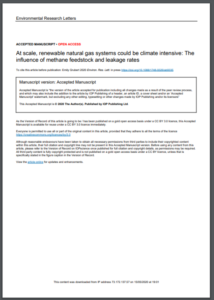Full Title: At Scale, Renewable Natural Gas Systems Could Be Climate Intensive: The Influence of Methane Feedstock and Leakage Rates
Author(s): Emily Grubert
Publisher(s): Environmental Research Letters
Publication Date: May 14, 2020
Full Text: Download Resource
Description (excerpt):
Renewable natural gas (RNG) is a fuel comprised of essentially pure methane, usually derived from climate-neutral (e.g., biogenic or captured) carbon dioxide (CO2). RNG is proposed as a climate friendly direct substitute for fossil natural gas (FNG), with the goal of enabling diverse natural gas users to continue operating without substantial infrastructure overhauls. The assumption that such substitution is climate friendly relies on a major condition that is unlikely to be met: namely, that RNG is manufactured from waste methane that would otherwise have been emitted to the atmosphere. In practice, capturable waste methane is extremely limited and is more likely to be diverted from a flare than from direct atmospheric release in a climate-conscious policy context, which means that RNG systems need to be more destructively efficient than a flare to provide climate benefits versus the likely alternative management strategy. Assuming demand levels consistent with the goal of using existing FNG infrastructure, RNG is likely to be derived from methane that is either intentionally produced or diverted from a flare, so essentially any methane leakage is climate additional. Further, in a decarbonizing system, RNG will likely compete with lower-emissions resources than FNG and thus provides fewer net emissions benefits over time. Anticipated leakage is climatically significant: literature estimates for methane leakage from biogas production and upgrading facilities suggest that leakage is in the 2-4% range (mass basis), up to as much as 15%. Policy makers should consider that under reasonable leakage and demand assumptions, RNG could be climate intensive.
